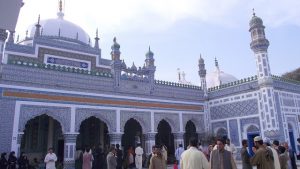Newspaper Article 27/02/2017
Islam in the subcontinent was spread through Sufism. Even today, the Shrines play an important spiritual role in the lives of a majority of Pakistanis. The Sufi teachings of peace and tolerance continue to be a part of the lives of many Pakistanis, and are a testament to the fact that in religion there is no room for violence. The people visit Shrines to have solace, they recite Holy Quran, are engrossed in marsiya khwani and some perform dhamaal. The terrorist attack on Lal Shahbaz Qalandar shrine in Sehwan Sharif has killed 88 people, including women and children, and around 250 have been injured. Daesh has claimed the responsibility of the attack. To target the large crowds of people at Shrines (or other public places) is neither being religious nor is it a heroic act. The Quran emphasizes, ‘whoever kills an innocent person, it is as if he has killed all of humanity. And whoever saves a person, it is as if he has saved all of humanity’. The terrorist organizations atrocities, including the killing of women and children nullify their claim to be defending Islam and Muslims. As part of this narrative, the concept of jihad is wrongly manipulated. Jihad is a “holy struggle” against the evil and “the conquest of self”.
Seeing Pakistan’s battle against militancy, the country has launched military operations against the miscreants. The political and the civilian population have stood beside the military in the fight against terrorism. The hostile regional environment has also been a major challenge for Pakistan. The suicide bomber in Lahore attack (February 13) was from Kunar, Afghanistan; his accomplice Anwaarul Haq from Bajaur agency has been arrested. Haq is a member of Jamaat-ul-Ahrar, splinter group of TTP (Tehreek-i-Taliban Pakistan). In February, Quetta and South Waziristan also witnessed terrorist attacks. Lashka-e-Jhangvi al-Alami and the TTP were behind the attacks. These recent terrorist attacks have heightened the security threat in the country. The losses which have been incurred in the terrorist attacks have intensified despair. The ones who have lost their near and dear ones cannot be brought back; their suffering and pain is likely to grow with each passing day. The agenda behind these anti-Pakistan endeavours is to isolate Pakistan and create impediments towards the regional connectivity projects. The enemy wants to create a paralyzing affect but we should not give up the struggle, and continue with the counter terrorist efforts relentlessly. Pakistan as nation needs to fight back and should not fall prey to such heinous designs. The country’s political and military leadership have vowed to give a befitting response to the terrorists. The border with Afghanistan has been closed.
To counter the threat of terrorism, the extremist ideology needs to be defeated. As stated by Omar Hammami “The war of narratives has become even more important than the war of navies, napalm, and knives.” The National Action Plan (NAP) has put a ban on hate speech and extremist material (reference point 5 NAP). The misuse of mosques in spreading of militant ideas needs to be controlled. NAP has also prohibited the glorification of extremists on media (point 11). Besides, there is also a provision to take action against those who lure youth towards extremism through social media (point 14). However, to ensure an effective implementation of NAP, the state institutions need to incorporate the various segments of society, including teachers, parents, sportsmen and the youth. Media should play a constructive role, the ideas instigating polarized views should not be projected. Muslim scholars have the capacity to speak at great lengths to promote peace. The lack of communications and media training to disseminate their knowledge to broader audiences is a major hindrance. To counter the terrorist narrative, religious scholars – need to be integrated into modern technological platforms and online social networking sites. Religious programmes/talk shows should be organized, in which, public queries pertaining to religious issues should be addressed. De-radicalization seminars and lectures on Youtube and facebook should also be shared.
[A version of this article appeared in Pakistan Observer dated 24 February 2017]
Disclaimer: Views expressed are of the writer and are not necessary reflective of IPRI policy.



